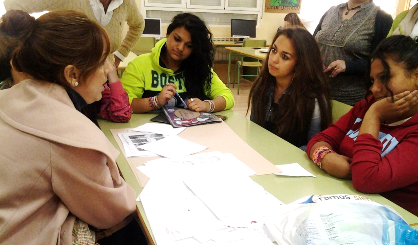Changing the world one step at a time
 A step is all that is required to start the process of changing the world. Modest though it may be. IES Francisco García Pavón in Tomelloso (Ciudad Real) is working on it. This high school has introduced an Equality Plan, well aware that school is the right place to foster principles and values. This initiative is included within the project Equal Education (Plurales), promoted by Women’s Institute in the framework of Gender Equality Programme funded by EEA Grants.
A step is all that is required to start the process of changing the world. Modest though it may be. IES Francisco García Pavón in Tomelloso (Ciudad Real) is working on it. This high school has introduced an Equality Plan, well aware that school is the right place to foster principles and values. This initiative is included within the project Equal Education (Plurales), promoted by Women’s Institute in the framework of Gender Equality Programme funded by EEA Grants.
12.05.2014
Have you ever thought if the language you use is sexist? Or, do you consider there are women’s work and men’s work? Do you think that Spanish teenagers are aware that gender-based violence begins long before the first slap? Answers to these questions may amaze you. For that reason, IES Francisco García Pavón decided to take part in this project. Because there is a long way ahead for equality between men and women and it begins at school.
Equal Education (Plurales) Project, a predefined project included within the EEA GrantsGender Equality Programme, operated by the Secretary of State for Social Services and Equality, aims to create an intervention model to facilitate the design and implementation of equality plans at schools to foster equal opportunities between women and men within the classrooms.
IES Francisco García Pavón is one of the Spanish nine schools which take part in the project. “The first phase was a diagnosis of the situation of equal education, with the participation of students, parents and teachers”, explains Victoria Viciana, Director of Studies. Then, the specific intervention model was configured, with Women’s Institute counselling and training, and it was launched last January. Phase 3 is in progress with the Women’s Institute monitoring in order to evaluate the project results.
“I want to keep studying and become a lawyer, but above all I don’t want to get married at 16”. These are the words of a Roma girl and they have a special value. She is one of the pioneers in her community to go to the school in this town in La Mancha, where “the normal thing” for the Roma women is to stay at home and get married as soon as possible. She attends the workshops organized by Ana, a enthusiastic social worker who tries to break down stereotypes and open teenagers’ eyes to new opportunities through dialogue and activities.
The workshops also try to do its bit to help female teenagers to detect early warning signs of possible gender-based violence. For instance, boyfriends controlling their mobile phone or deciding how they dress or if they can go out with friends. “We try to foster girls self-esteem and make them understand that love have to add positive things to their lives, if love takes things off is not real love”, explains Ana.
Among the initiatives implemented in this high school –attended by a large number of children with special educational needs- are women’s poetry recital, mixed sport and cultural competitions, exhibitions, workshops… However, Equality Plan in this educational centre goes beyond girls playing football or boys writing an essay about romantic love. Equality Plan is something that permeates daily educational activity. It’s their small step to change the world.